Certification overview
This page contains information about Food Safety certification in different countries, by Claudia Munnecom. In total there are 38.461 companies in eleven countries with a BRC, IFS, or FSSC 22000 Food Safety certification. Discussed will be the countries: Germany, Denmark, Belgium, France, Spain, Italy, United Kingdom, Poland, Sweden, India, and The Netherlands. And their BRC, IFIS, or FSSC 22000 Certification.
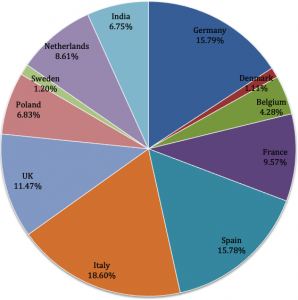
Figure 1. the total percentage of companies Food Safety certified (BRC, IFS and FSSC) in different countries.
Food safety has become a serious concern for the food industry’s whole supply chain. In fact, food poisoning, allergic reactions, and other health risks can all occur because of eating contaminated food. It is indispensable for food producers to have food standards certification such as BRC, IFS, or FSSC because they are the foremost food safety standard in protecting customers’ health from food poisoning, allergic reactions, and other health risks. Thereby, certified food companies in BRC, IFS, or FSSC ensure product safety, integrity, legality, and quality.
From the 11 countries chosen for this study (Italy, Spain, France, Belgium, Denmark, Germany, India, Netherlands, Sweden, Poland, and the UK), the majority of certified companies are located in Italy, Germany, and Spain. They represent the three countries with the highest number of food companies certified in food safety and quality standards as they constitute around 50% of the total number of food safety accreditation from the 11 countries analyzed.
Examining each country’s number of food safety certified companies, Italy has the most food producers accreditation on food safety with 18.6%, coming after Germany and Spain with both 15.7%. Then, they are followed by the UK with 11,47%, France representing 9,57%, and the Netherlands with 8,61%. The least certified countries are Poland, India, Belgium, Denmark, and Sweden which have less than 7% of food safety licenses within the countries.
In conclusion, Italy, Spain, and Germany have the most certified food producer companies compared to the other countries. Consequently, they are producing more safe food which results in long-term cost efficiencies and higher profit by reducing their risk of contamination and waste through costly food recalls and by increasing the amount of exported food.
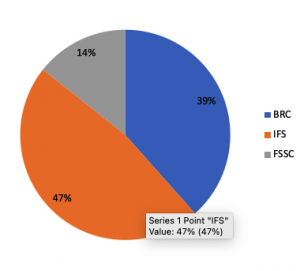
Figure 2. Representation of food safety certification in several countries.
IFS certification
IFS certification has the most number of countries which include Italy, Germany, Spain, Denmark, Belgium, France, and Poland. IFS is one of the most popular certification standards, especially in Europe, in total 47% of the food accreditation are IFS. Whereas, the United Kingdom and the Netherlands are most certified in BRC which represents 39% in total and is the main leading trade body for UK retailers. Lastly, Sweden and India are the most certified in 22000 FSSC, which constitutes only 14% of all food producer accreditation, a certification mostly adopted by non-European countries.
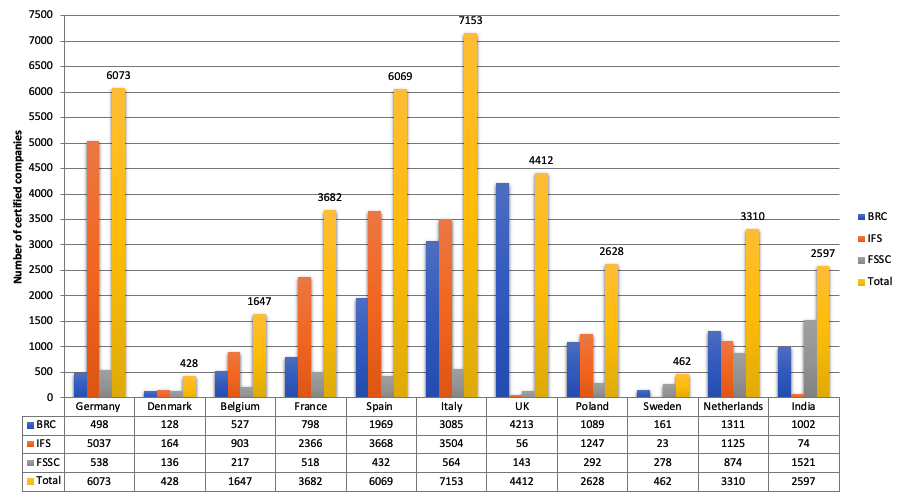
Figure 3. Overview of countries certified in food safety BRC, IFS, and FSSC.
Italy has the highest number of food manufacturers certified with 7153 companies out of the total numbers of food accreditation. Followed by Germany with 6073, Spain with 6069, the United Kingdom with 4412, and France with 3682.
The other least certified in food compliance countries are as follows the Netherlands, Poland, India, Belgium, Sweden, and Denmark with less than 3500 food producers accredited.
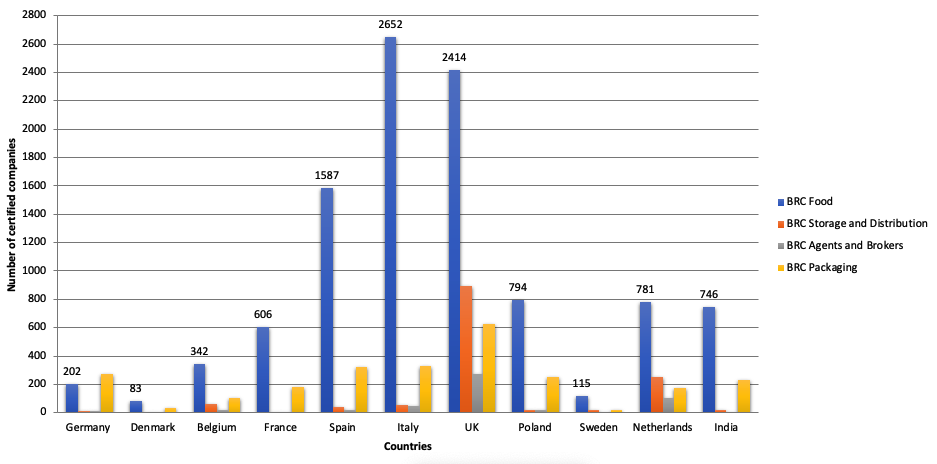
Figure 4. Total number of companies BRC certified in different countries
The above figure 4, demonstrates the overview of different BRC types of accreditation between countries. In total there are four types of BRC certification: Food, Storage and distribution, Agent and brokers, and Packaging.
BRC certification
The figure shows that BRC Food is the main type of certification acquired in most countries. Italy has the highest number of food manufacturers certified with BRC Food with 2652, followed by the United Kingdom with 2414, Spain with 1587, Poland with 4412, and the Netherlands with 3682. The other least certified in BRC food countries are India, France, Belgium, Germany, Sweden, and Denmark with less than 700 food producers accredited.
From the countries compared, It’s shown that BRC Food is the main type of license acquired by food producers with 70% followed by Packaging which represents 17%, storage and distribution with 10% then by agents and brokers with only 3%.
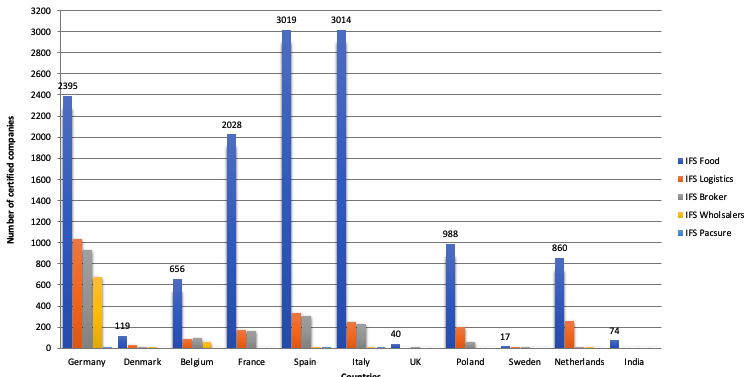
Figure 5. Number of companies IFS certified in different countries.
The above figure 5, demonstrates the overview of different IFS types of accreditation between countries. In total there are five types: Food, Logistics, Brokers, Wholesalers, and Pacsure.
The figure shows that IFS Food is the main type of certification acquired in most countries. Spain has the highest number of food manufacturers certified with IFS Food with 3019, followed closely by Italy with 3014, Germany with 2395, France with 2028, and Poland with 988. The other least certified IFS food countries are as follows Netherlands, Belgium, Denmark, Germany, India, UK, and Sweden with less than 900 food producers accredited.
Regarding the countries compared, it is shown that IFS Food is the main type of license acquired by food producers with 73%. Followed by logistics which represents 13%, broker with 10%, and then by wholesale with only 4%.
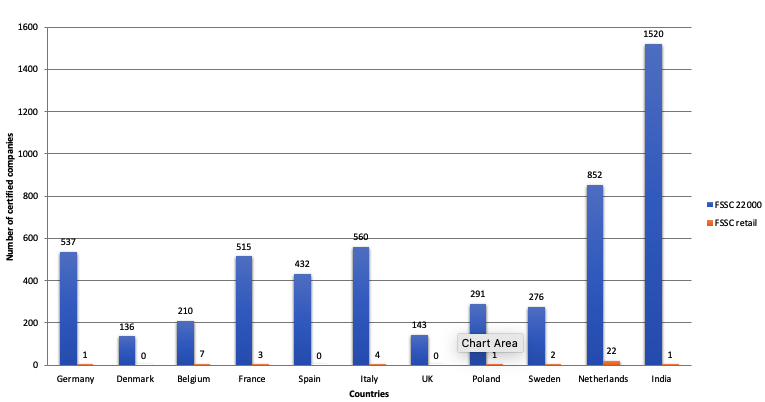
Figure 6. Number of companies FSSC certified in different countries.
Figure 6 demonstrates the overview of different FSSC types of accreditation between countries. In total there are two types of FSSC: FSSC 22000 and FSSC retail.
FSSC 22000 certification
The figure shows that FSSC 22000 is the main type of certification acquired in most countries. India has the highest number of food manufacturers certified with FSSC 22000 with 1520. Followed by the Netherlands with 852, Italy with 560, Germany with 537, and France with 515. The other least certified in FSSC 22000 countries are as follows Spain, Poland, Sweden, Belgium, the United Kingdom, and Denmark with less than 500 food producers accredited.
Regarding the 11 countries compared, it is clearly shown that FSSC 22000 is the main type of license acquired by food producers.
Related articles to BRC, IFS, FSSC 22000 Certification: overview of 11 countries
Many customers and visitors to this page 'BRC, IFS, FSSC 22000 Certification: overview of 11 countries' also viewed the articles and manuals listed below:
